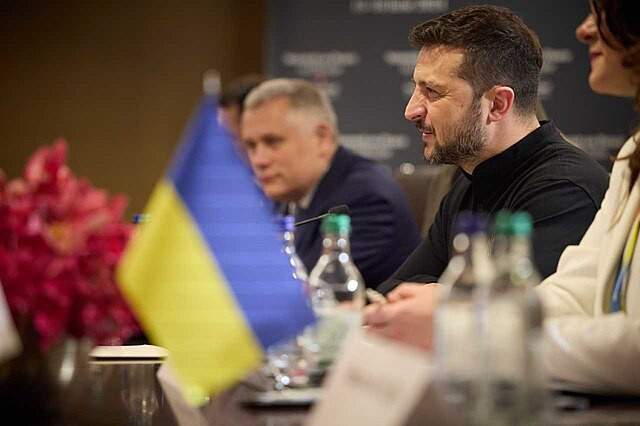Ukrainian President Volodymyr Zelensky confirmed that Ukrainian forces are actively fighting within Russian territory, marking the first official acknowledgment of a cross-border incursion that has rattled the Kremlin. The unexpected offensive in Russia's Kursk region, now in its sixth day, represents a significant shift in the dynamics of the war, which has predominantly taken place on Ukrainian soil.
"Ukraine is proving that it really knows how to restore justice and guarantees exactly the kind of pressure that is needed - pressure on the aggressor," Zelensky declared in his nightly address to the nation. He expressed gratitude to Ukraine's armed forces for making it possible "to push the war out into the aggressor's territory," a move that has undoubtedly stunned both Russian forces and Ukraine's Western allies.
The operation, which remains shrouded in strategic secrecy, has seen Ukrainian troops advancing as far as 20 kilometers (12 miles) into the Kursk region. Russian authorities have struggled to contain the advance, leading to the imposition of a sweeping counterterrorism operation in Kursk and two other border regions. Tens of thousands of civilians have been evacuated from the affected areas, underscoring the severity of the situation.
The attack on Kursk is unprecedented in the more than two-year-old conflict. While Ukraine has targeted Russian border regions like Belgorod with airstrikes and limited cross-border raids, this marks the first time regular Ukrainian forces have pushed so deeply into Russian territory. Videos circulating on social media show Ukrainian soldiers replacing Russian flags with Ukrainian ones, a symbolic gesture that highlights the audacity and impact of the incursion.
In response, Russian President Vladimir Putin has called the operation a "major provocation" and ordered the deployment of additional troops and weapons to the region. The Russian Defense Ministry reported that it had intercepted multiple Ukrainian drones and missiles, but the Ukrainian forces have continued to hold their ground, with geolocated footage and reports from Russian sources indicating that Ukrainian troops have even advanced further.
The Institute for the Study of War (ISW), a U.S.-based conflict monitoring group, noted in its latest assessment that Ukrainian forces have maintained their positions and continue to challenge Russian control over the area. By Friday, Russian authorities had reportedly lost control of at least 250 square kilometers of territory in Kursk, according to independent analyses and mapping by CNN.
As Ukrainian troops dig trenches and fortify their positions, there are growing indications that they intend to maintain a presence in the region, at least for the foreseeable future. This development suggests that the Kursk front could become a new and significant theater of war, potentially diverting Russian resources from other critical fronts in Ukraine.
The implications of this incursion are far-reaching. The ISW suggests that the Kremlin may be deliberately downplaying the severity of the situation to prevent domestic panic or backlash. Despite the gravity of the attack, Putin has refrained from declaring a state of war or general mobilization, a decision likely aimed at maintaining domestic stability.
Meanwhile, the situation in Ukraine remains dire. Russian forces have continued their relentless assault on Ukrainian cities, with drone and missile attacks reported in the Kyiv region. On Sunday, a Russian strike in Brovary, just east of Kyiv, killed a four-year-old boy and his father, while another child was seriously injured. The attack came on the heels of a deadly strike on a supermarket in Kostiantynivka, Donetsk region, which left at least 11 people dead and 37 injured.
Zelensky, in a video statement, condemned the ongoing Russian aggression, highlighting the more than 30 missiles and over 800 guided aerial bombs launched by Russia in recent days. The Ukrainian Air Force reported that Russia had used a mix of North Korean ballistic missiles and Iranian-made drones in its latest attacks, a claim that CNN could not independently verify.






